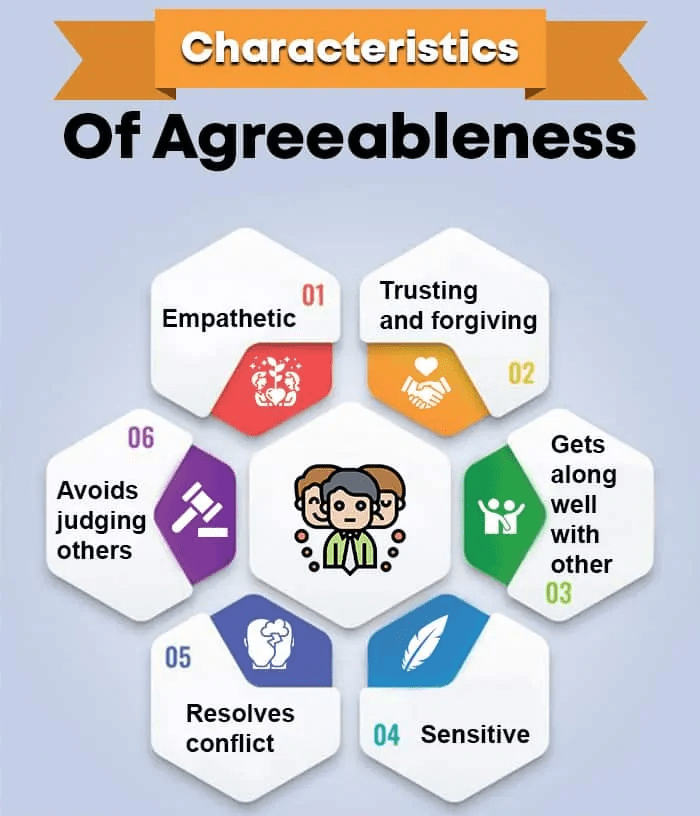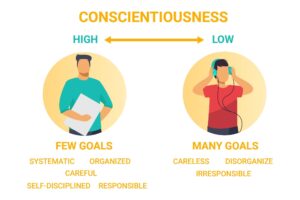What is Agreeableness?
Agreeableness, one of the Big Five Personality Traits, reflects how much you adjust your behavior to suit others.

Highly agreeable people are described as cooperative, polite, kind, and friendly. They are also more trusting, affectionate, generous, and empathetic.
Agreeable people are generally more cooperative and less competitive and try to resolve conflicts in acceptable ways to everyone involved.
They are averse to using force to get others to do what they want and prefer negotiating to agree.
Agreeable people are motivated to have satisfying, close relationships, so they’re more willing to do things that maintain those relationships.
Not surprisingly, the friends are more likely to control their anger and negative emotions and are more inclined to avoid conflict.
Agreeableness can be seen in early adolescence, if not sooner, and has 42% genetic influence.
Agreeableness Traits
The following traits fall under the umbrella of agreeableness:
- Altruism
- Trust
- Modesty
- Humbleness
- Patience
- Moderation
- Tact
- Politeness
- Kindness
- Loyalty
- Unselfishness
- Helpfulness
- Sensitivity
- Amiability
- Cheerfulness
- Consideration
People who are high in these traits are typically polite and like people.
Conversely, those who are low in this trait tend to ‘tell it like it is.
Facets of Agreeableness
1. Trust
- High Score – Assumes that people have excellent and trustworthy intentions.
- Low Score – Views people as selfish and only after their interests. Sees people as a threat to interests and well-being.
2. Altruism
- High Score –Feels rewarded when helping others. Doing things for others is not seen as self-sacrifice. The sense of fulfillment is taken from the act itself.
- Low Score – Feels that helping those in need is an imposition. They recognize it but don’t have to do anything about it.
3. Honesty
- High Score – Straightforward and sincere. Doesn’t feel the need to manipulate people to get what they want. Easy to relate to.
- Low Score – Believes in using a little deception when dealing with people when it’s convenient. But, unfortunately, it tends to be devious and secretive.
4. Modesty
- High Score – Doesn’t claim that they’re better than others. Humble. Usually has low self-esteem.
- Low Score – Viewed as arrogant. They take advantage of every opportunity to prove superior to those around them.
5. Cooperation
- High Score – Avoids confrontations like the plague. They will keep the peace even if it compromises their needs and interests to get along with people.
- Low Score – Forces their will to get your way. Intimidation and aggression are some of the strategies they employ.
6. Sympathy
- High Score – Easily moved to pity. It feels and relates to the pain of other people.
- Low Score – Low empathy. Not inclined to be merciful.
High Agreeableness
You are very considerate of others and typically try to avoid conflict.
Others usually describe you as friendly, selfless, generous, and helpful.
Being high in agreeableness allows you to find room for compromise in nearly every situation.
You are always willing to listen to others’ opinions and ideas, even when you think they are wrong.
This can sometimes be problematic in decision-making situations – your friendly personality prevents you from speaking up when someone else is very opinionated, and you may end up going along with their ideas, even when you disagree.
Because of their ability to mediate conflict and help others, those with high agreeableness typically do well in careers as managers, counselors, and non-profit workers.
Common Traits:
- Has a great deal of interest in other people.
- Cares about others.
- Feels empathy and concern for different people.
- They enjoy helping and contributing to the happiness of other people.
- Assists others who need help.
Medium Agreeableness
Others often describe you as friendly and helpful.
You typically try to avoid conflict but aren’t afraid to speak up when a situation arises.
In group situations, it can be easy to strike a comfortable balance between keeping everyone happy, speaking up, and making the right decision.
You are pretty generous and enjoy doing what you can to help others.
You may find yourself volunteering or helping friends and family with various projects in your free time.
You believe helping others is important but have not felt the need to devote your entire life to helping others.
You do what you can to help while ensuring you are not being taken advantage of.
Low Agreeableness
Others describe you as outspoken and bold. You don’t usually go out of your way to help others but are willing to help close family and friends when needed.
Life has taught you that you must watch out for yourself and your family before going out of your way to help others. Because of this, it takes you quite a while to trust others.
You value choosing the right option in group situations rather than keeping everyone happy.
You do what you can to convince others that you are right. For example, you typically try to make them see things your way.
You try to be as objective as possible to ensure you make the right choice.
When interacting with others, you are very pointed. But, unfortunately, our mouth sometimes gets us into trouble because we are outspoken.
Common Traits:
- Takes little interest in others.
- They don’t care about how other people feel.
- Has little interest in other people’s problems.
- Insults and belittles others.
- Manipulates others to get what they want.
Can You Become More Agreeable?
A person can become more agreeable over time. A study in the Journal of Personality and Social Psychology showed that this personality trait is somewhat adaptable as people age.
People become more emotionally stable, conscientious, and agreeable later, but age isn’t the only factor. Sometimes, a work environment demands team effort and partnership; collaboration requires a measure of agreeableness.
Altruism can rub off on people; seeing someone doing good can perpetuate kindness and charity. Plus, living through the hardships of life can make a person more agreeable. Of course, being too amenable isn’t always a good thing.
For example, giving in to an argument to remain friends isn’t always the best outcome; certain situations demand less congeniality, like managing financial negotiations or other potentially discomforting scenarios.
The Dark Side of Being Agreeable
- People tend to take advantage of you.
- Those who score high on agreeableness tend to have lower salaries.
- It has to do with a person’s aggressiveness.
- More aggressive people are more successful.
- You may be more open to disappointment when people let you down.
- Your inability to say “No” and avoid conflict makes you an inferior leader.
- You can’t make decisions if they hurt other people’s feelings or if you will step on someone’s toes.
- Being super friendly, you tend to be overly familiar with your colleagues and staff.
- This might undermine your authority and professionalism.
- Successful career people must be critical to implement improvements.
- They accept that not everyone will like them.
- This is unacceptable if you are too agreeable.
- Since you don’t want to inconvenience anyone, you might be overworked – taking on more tasks than you can handle and not wanting to delegate and be a bother.
- Over-agreeable people do not try to change the world if it offends anyone.
- They will keep the status quo regardless of their feelings.
- You are more prone to health issues since you think of yourself last.
- Agreeableness with Low Self-Esteem is the most dangerous of all.
- Whatever it takes, you want to please and make people like you.
- Prone to worry and anxiety about not being liked.



